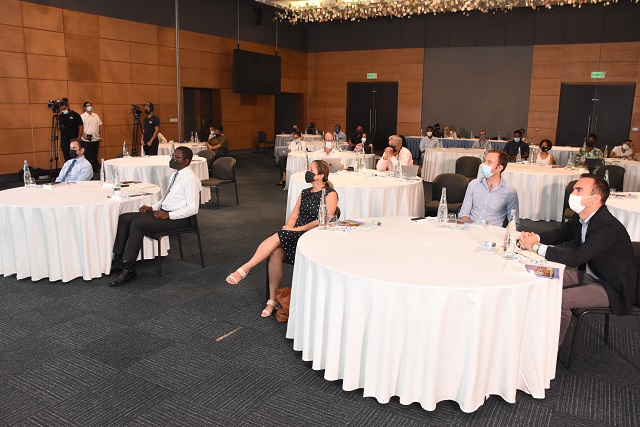Seychelles on Thursday examined ways to help visitors minimise their carbon footprint when staying in the island nation during a “Green Recovery of Tourism” symposium.
The symposium was organised by the British High Commission in partnership with the local ministries of tourism and environment and included the participation of the tourism sector.
The principal secretary of tourism, Sherin Francis, said that “the symposium comes at an important time in our tourism recovery stage, as we think of how to get our industry to recover from the effects of COVID-19.”
“At the same time, we need to realise that there are bigger challenges that the country will face in the future if they are not addressed, and these are the effects of climate change. Through the symposium, we have brought together many actors from the tourism industry together so as to talk about what more we can do, which commitments we need to start taking today and know the commitments that the country has made on an international level in terms of reducing the amount of carbon dioxide being released into the atmosphere,” said Francis.
“We hope that by the end of the day, we can come out with more knowledge on the issue, so as to share these with our partners,” she added.
The symposium was organised by the British High Commission in partnership with the local ministries of tourism and environment. (Seychelles Nation) Photo License: CC-BY
On his side, Sylvestre Radegonde, the Minister of Tourism, said that with the visitor arrival numbers more than doubling in the past two decades, the island nation’s tourism industry has gotten too comfortable.
“Events of the last two years have shown us how rapidly our world is changing and how vulnerable tourism is to external factors. In 2020, Seychelles lost over 60 percent of its tourism revenues due to the COVID pandemic. A full recovery demands that we adapt yet more long-term measures that will address not just the effects of the ongoing pandemic, and increasing competition from similar destinations, but also measures that address our vulnerability to the effects of climate change and global warming,” said Radegonde.
Through presentations, participants highlighted the economic and climate urgency of implementing and promoting an inclusive nature-based and climate-minded tourism industry, as well as raising awareness on tourism’s commitments and tourism-focused key findings in the revised Nationally Determined Contributions (NDCs) for Seychelles.
Examples of good climate mitigation and adaptation practices, such as the Seychelles Sustainable Tourism Label (SSTL) and the Green Footprint Seychelles campaign, were also showcased so as to inspire other tourism establishments to replicate these efforts.
“Visitors who want to reduce their carbon footprint are on the increase. Visitors who want to achieve this might want to stay in a hotel that is SSTL certified, and we want to ensure that these establishments are well marketed so that visitors know they exist. At the moment, only establishments are being certified under this label, however, it is in our plan to involve all the remaining operators in the industry,” said Francis.
At the end of the symposium, participants signed an outcome document to capture their willingness to link conservation and tourism more inclusively and work towards a nature-based tourism recovery.

